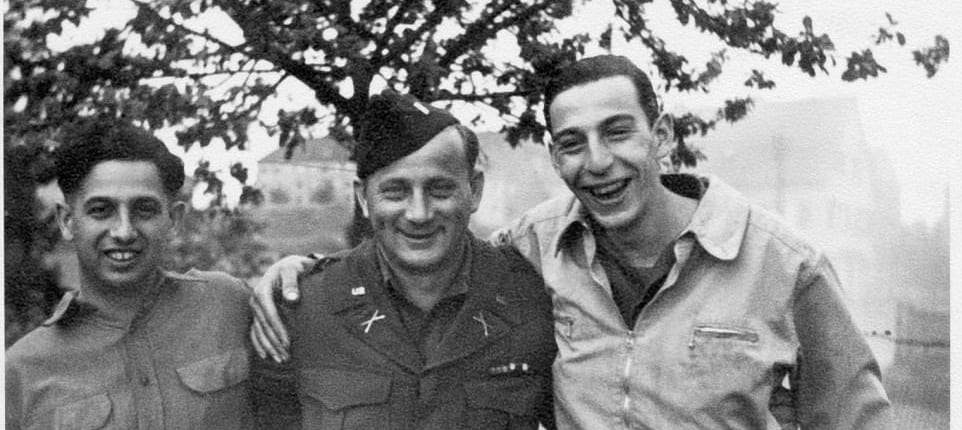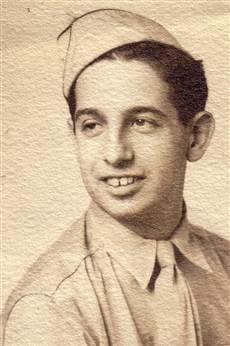
Guy Stern, Walter Sears and Fred Howard
By Sabrina Fine, Communications Intern
Dr. Guy Stern is a man of many titles. Literary scholar, Bronze Star Medal recipient and published author- to name just a few.
Stern was born in Hildesheim, Germany in 1922. He escaped from Nazi Germany and relocated to the United States in 1937 with the help of an uncle and an American Jewish organization. He hoped that his parents and two siblings would follow.
In 1943, he was drafted into the Army and in 1944 landed in Normandy after D-day as a Ritchie Boy. Ritchie Boys were a military intelligence unit made up of mostly German, Austrian and Czech refugees and immigrants, many of whom were Jewish.
“Beyond the fighting spirit of all GI”s, the knowledge of the Holocaust was an added incentive to put forth our utmost effort in the war, we were refugees; our own families were being murdered,” said Stern.
Since Stern spoke German he was tasked with the interrogation of prisoners of war and defectors. Stern’s story was highlighted in the book Sons and Soldiers, “the untold story of the Jews who escaped the Nazis and returned with the U.S. Army to fight Hitler.”
Stern, along with fellow Ritchie Boy Fred Howard, devised a plan to extract information from German soldiers after previous more traditional methods did not work.
“My friend and comrade Fred Howard found that the German soldiers were afraid beyond everything else of landing in Russian captivity,” said Stern. “We played on that fear by telling the enemy soldiers that we had orders to turn them over to the Russians, if they did not cooperate. We got vital info for our air force that way. I disguised myself as a Soviet commissar and liaison officer. I donned a Russian uniform for that purpose; Fred played a soft-hearted American.”
Stern also adopted a Russian accent, despite not knowing how to speak Russian. Stern’s method allowed him to gather important intelligence as well as earn him a Bronze Star.
“I could make a contribution to the war effort as an interrogator of POWs by introducing mass interrogations in order to assess the strength of the last German replacement divisions and to report on the German potential for gas warfare,” said Stern.
Stern was born in Germany, yet never once hesitated in his allegiance to the United States and he felt very much American.

Guy Stern
As a Jew, American soldier and a human, he never erased memories of what he witnessed in Buchenwald. In a 1990 oral history recording for the United States Holocaust Memorial Museum, he spoke of the horrors. When he arrived at Buchenwald, Stern remembered feeling queasy.
His unit helped set up food and water for recently liberated prisoners, yet the prisoners were still dealing with shock and not fully comprehending they were free.
When speaking of the experience, Stern’s demeanor changed. His eyes became heavier and he looked off to the side in search of words to describe the almost indescribable.
He recalled a story of a man who was stooped down to a puddle of muddy water and was readying himself to drink from it. From Stern’s perspective, it looked like something routine. Stern’s unit had just set up clean water in the camp for the recently liberated survivors.
The survivor needed to be gently reminded and pointed in the direction of the clean water. Only then did he abandon the dirty puddle.
“To summarize it- it was almost as if you had to unlearn the concentration camp experience,” said Stern about the survivors.
Before leaving Buchenwald, Stern recalled despite their grim conditions and poor health, the survivors seemed very grateful. He remembers the scene of them coming to the fence to greet the Americans.
After the war, Stern learned his whole family had perished in Warsaw.
In 1948, he graduated Hofstra and went on to receive his Ph.D. from Columbia University in German Literature and Culture. Doing so required Stern to wrestle with some deeply personal decisions.
“I could have entered a variety of fields,” said Stern. “I found to my satisfaction, and that of my professors that I had some gifts for German literature and German cultural history.”
Yet the troubling thought was, if he continued studying German, he would be constantly reminded of Germany and its past and the terrible memories of his youth.
“I came to the recognition I indeed had a gift and to deny it, or to let it lie fallow would be an act of self-amputation, very much like the one they were going to inflict on me, it was doing the work of the enemy,” said Stern. “So, I decided to stay in German.”
He also believed he could make a difference for the victims of Nazi Germany.
“I’ve made the right decision because I’ve lent voice to some writers who may [otherwise] have been forgotten,” said Stern. “I have in a way kept their memory and the memory of their writings alive,” said Stern.
Stern currently directs the Harry and Wanda Zekelman International Institute of the Righteous at the Holocaust Memorial Center in Farmington Hills, Michigan.
Volume 72. Number 4. Winter 2018

